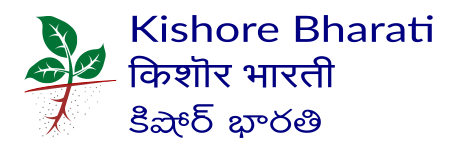50 years of KB
Freeing itself from the clutches of British rule, an Independent India envisioned to build free India’s education in a manner that would spearhead a silent reconstruction of our society and would also be linked to the developmental aspirations of the people. The *Kishore Bharati (KB) Group* emerged during 1969-70 out of a deep concern for the way this vision was side-lined to push Macaulay’s model of colonial education for maintaining status quo. Early in its inception, KB Group realized the priority of intervening in the established school system. Children of the upper primary stage (Classes VI-VIII) would learn science by conducting experiments with their own hands , recording their observations, collecting and analyzing data, discussing among themselves, inferring and thereby understanding scientific concepts and acquiring knowledge. Textbooks were replaced by workbooks, teachers were reoriented to a radically changed culture of learning and, most significantly, the government persuaded to ask no question in exam papers that is based on rote learning. Only such questions were promoted that would test the children’s ability to question, observe, explore, analyse and infer.
What started as a small hesitant step in 16 government schools in May 1972 in two Blocks (Hoshangabad and Bankhedi) of Distt. Hoshangabad of Madhya Pradesh, became known later as the Hoshangabad Science Teaching Programme (HSTP). In 1990s, HSTP engaged about 1,000 schools and one lac students in learning through experiments and more than 1,000 teachers in challenging the unscientific, undemocratic and anti-child pedagogy of rote-learning. When HSTP was at its peak, there was not a single school in the country outside this programme- neither any of the famed Central Schools/ Navodaya Vidyalayas nor any of the elite expensive ‘public’. The 6-year old HSTP succeeded in establishing the basic validity of both the radical pedagogy of science education as well as of the crucial role of pro-people intervention in government school system.
Interestingly, KB’s efforts at intervening in the established school system also involved experiments of working with the school students outside the system. About a dozen school dropouts belonging to landless and marginal farmer families. learned to acquire knowledge, build human values and develop multiple skills by growing groundnuts, managing animal husbandry, doing carpentry and selling their products in the local market. What Gandhi said in his historic address to the Wardha Conference (1937) was concretized as a pedagogy in this programme during 1972-78. Nai Talim experiment taught KB how to interweave productive work in the curriculum. The rich experience of the 5-6 years long experiment unfolded a range of radical pedagogic possibilities that seem to transcend even Gandhi’s own ideas, at least as far as practiced by his followers since early 1940s. It was again through the Nai Talim experiment that the KB group could discover the Freirian pedagogy of social transformation that awakened it to a new educational discourse in the post-emergency period.
